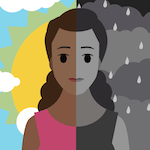Mental health concerns continue to rise across the globe. With social media, societal pressure, and the unknown future looming in the distance, there are many reasons for a child or an adult to slump into a deep depression. In fact, over 300 million people all across the age spectrum suffer from some form of depression. We want to do everything we can to protect our loved ones. So, how do you know the signs? Here are five ways to tell if your loved one is struggling with depression and how you can help.
Types of Depression
Let’s take a second to talk about depression as a whole. Over the years, wellness circles have worked hard to eliminate the stigma surrounding mental illness. This goal was set to create an open dialogue. Anyone battling with depression shouldn’t feel alone or like an outcast.
The truth of the matter is we all get depressed from time to time. It’s part of what makes us human. There are so many underlying factors that can trigger a bout of depression including a breakup, illness, death in the family, loss of employment, or a side effect to medications. However, these bouts tend to pop up once or twice a year and then go away. It’s when these feelings keep coming back around that an actual condition may be the culprit.
Before you go looking for signs that your loved one may have a mental illness, you should become familiar with different forms of depression. There are many conditions that can be classified as a depressive episode. Here are six of the most common forms of this mental health condition.
Major Depression
Major Depressive Disorder (MDD) affected 11 million adults and 2.3 million adolescents in 2017. This condition will consume your loved one's every waking thought and adversely impact their day-to-day life. Those with MDD lose their will to get out of bed, feel a crippling sense of dread, and may even exhibit suicidal tendencies.
Persistent Depressive Disorder
While those with Persistent Depressive Disorder shouldn’t have their symptoms minimized, they are a less extreme case of depression than a major depressive. Those with persistent depression feel low every day for at least two years. However, these negative feelings don’t interfere with their day-today-functioning and typically don’t drive a person to have suicidal thoughts.
Bipolar Disorder
This mental health condition also goes by Manic-Depressive Disease. Those with bipolar disorder live their lives through waves. Some moments they have extreme ups where they have an increase in energy and high levels of self-esteem. These instances are juxtaposed with harsh lows that cause them to fall into a deep depression. Those with bipolar disorder may exhibit destructive behavior both to themselves and others.
Seasonal Affective Disorder (SAD)
Seasonal Affective Disorder (SAD) wasn’t made up by someone who wanted to be by the beach on a cold winter day. It’s an actual condition that is triggered by the shortened winter days. With less sunlight, the body’s circadian rhythm gets thrown off. As a result, SAD may cause hormonal imbalances that spark bouts of depression.
Perinatal Depression
Speaking of hormones, never are they more out of whack than when someone has a baby. Perinatal depression causes major and minor depressive episodes. These moments can happen during pregnancy and up to a year after the birth of a child.
Premenstrual Dysphoric Disorder (PMDD)
The only time when hormones are just as out of whack as pregnancy is during a menstrual cycle. Those who experience severe PMS symptoms may battle PMDD, as it tends to affect people shortly after ovulation begins. PMDD will carry through until menstruation ends. To help fight these depressive bouts, it’s best to get the PMS symptoms under control.
Using an all-natural supplement like Estrolene can help alleviate the discomfort that comes with PMDD by fighting off night sweats, lowering cortisol levels, and balancing out vaginal moisture. In turn, the body doesn’t feel the excess stress that comes with PMS, therefore, stopping a potential depressive episode.
Signs Your Loved One Suffers From Depression
We all get busy in our everyday lives. However, we need to sometimes take a moment and really interact with our loved ones. Watch them. Listen to them. Ask them questions. These are the best ways to figure out if your loved one is suffering from depression.
When you are talking to them, engaging with them, or watching them, see if any of these signs and symptoms of depression pop up. If so, try starting a dialogue with your loved one or seek professional help for advice. Here are some signs that may indicate your loved one is battling deep depression:
They Give Away Their Items
While living a less materialistic lifestyle is applaudable, a sudden shift to that mindset may be a bit alarming. Sure, possessions don’t define us, but we do place value in each item individually. Wanting to have a tag sale to get rid of a bunch of junk? That’s healthy! But if your husband gives his Derek Jeter signed baseball away or your teen lets their friends have their clothes, that’s a red flag.
A person who is contemplating suicide has thought about this decision very thoroughly. While they’re not thinking about their own future, many are concerned about the future of their loved ones. They want to give them items that will cushion the blow of their exit and maybe even better their life in the future.
If you notice your loved one being frivolous with money or possessions, ask them why they're acting so loose with their resources? Bring up future ramifications of their behavior and pay close attention to their response.
Withdrawn Interest in Activities
Possessions may not define us, but our interests do. Things that bring us joy are what people associate with us in their minds. Parents remember their daughter’s first marathon. Wives remember their spouses’ successful art exhibit. When loved ones stop doing the things that make them happy, it’s a sign that they’re not happy.
Sometimes we get busy and put things we love on the backburner. That’s why we need loved ones to remind us who we are. If you suspect your loved one is withdrawing from their interests, invite them to partake in these activities. Bring your football nut to a game or your violin player to a concert.
Notice their reaction when you ask. Do they decline? Are they hesitant? Did you have to twist their arm? If that’s the case, how was it when they got there? When something that used to bring someone joy doesn’t anymore, that might be a sign your loved one is suffering from depression.
Change in Eating Patterns
As humans, we’re creatures of habit. We get set in our ways. Therefore, any change in our loved one’s day-to-day routine is a sign that something is amiss.
Research indicates that eating in excess is a sign of depression. When we are depressed, we are trying to fill a void inside of ourselves. Food triggers the secretion of dopamine, our reward neurotransmitter. In search of this joy, people turn to food.
If your loved one is eating less, this may also be a cause for concern. Up to 80% of serotonin, our joy neurotransmitter, is produced in our guts. Depriving themselves of nutrients naturally makes your loved ones susceptible to depression.
If your loved one is exhibiting a change in eating patterns, try eating with them. Cook a meal for two and have them sit down to eat with you. That way you can either create portion control or influence them to eat by doing so yourself.
Also, offer them natural supplements that may help boost their neurotransmitter deficiencies. Tranquilene contains tryptophan, an amino acid that is a precursor to serotonin.
It also contains the neurotransmitter GABA, which blocks impulses between nerve cells and has an incredible impact on mental health. Research indicates that the majority of people with MDD have GABA dysfunction.
They’ve Become Isolated
Don’t get us wrong. Me-time is the greatest self-care. However, there’s being an introvert … and then there’s being isolated.
When somebody starts cutting themselves off from their loved ones, there are three things that may be going on.
Isolation typically means:
- They want to dwell in their depression.
- They don’t want loved ones to see them in such a downed state.
- They want to prepare loved ones for a life without them.
These three steps are a progression to MDD. How rapid the decline happens is dependent on the person. If you notice someone is isolated, try getting them to come out. Bring your teen to the mall or invite your sister to come over and cook something for her.
Loss of Sleep
Research indicates that there’s a strong correlation between lack of sleep and depression. When you are depressed, your body produces an excessive amount of cortisol. This is a hormone in our system that incites feelings of stress. Ever lay in bed stressed? Yeah, no sleep happening there.
While you may want to give your loved one a sleep aid, you should rethink that strategy. People with depression also suffer from substance abuse. Offering sleep medications may cause a pattern of addictive behavior.
Instead, opt for an all-natural supplement like Sleep Fast. Sleep Fast contains melatonin, the hormone responsible for our sleep-wake cycle. Due to excess cortisol from stress, those who have depression lack melatonin.
By supplementing with this natural hormone, your loved one will get rest. Naturally, cortisol levels will fall. In turn, the body has room to produce other beneficial hormones. Hormonal balance may just be the realignment your loved one needs!
Getting Help for Your Loved One with Depression
Honestly, it’s hard to see all the signs. There are so many things you may notice in retrospect once you realize your loved one has depression. Don’t kick yourself. All you can do is look forward and figure out how to best be the rock they need.
If you notice that your loved one has become isolated and lacks joy in activities that once brought them happiness, take that as a red flag. When their routines become altered, like eating and sleeping patterns, take notice. Once loved ones start giving away prized possessions, please seek help. These are all vital signs that your loved one is suffering from depression.
Do you have a loved one battling depression? How do you help them? Share your experiences in our comments below!























